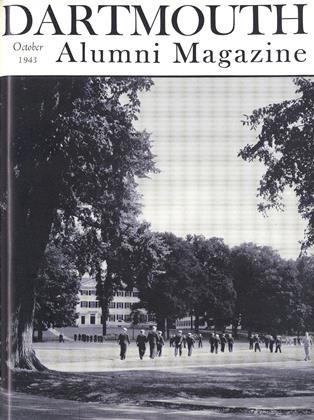Double Role of Dartmouth Undergraduate and Future Fighter, Confusing at First, Now Seems Typical of Day
In pre-war days an undergraduate, though inextricably involved in the pattern of college life, could somehow manage to look at it all objectively. Perhaps it was because he always had an abundance of that present scarcity—time. If he "was told, for example, to write an article about college life in just such broad terms, he could be leisurely expansive with his topic. He could stretch lazily on the green of the campus and take in enough of the "long cool shadows" and Dartmouth's "gleaming, dreaming walls" to properly drape his article with beautiful adjectives. He could bend a sweatered elbow and gulp enough beer to be rightly appreciative of the "soft September sunsets." Or he could have a morning-after headache and formulate a noble gripe against the College Administration and string his story with amusing invective. He could do lots of things.
Dartmouth is now a Naval Training Unit. Former undergraduates at every corner of the earth have now and then written about life at their war station. There is a rather striking difference between such writing and what they would have written about college. Almost a sullen terseness is noticeable. It is peppered with short, bare facts that seem to have the dynamite of their own ammunition behind them. Quick, deep emotion, irony, aliveness and simpleness is there. Even if written in leisure, it is not the leisure of the college that is there but the leisure of dreadful waiting.
Dartmouth is a war station and a college at once. The undergraduate is both an undergraduate and a man in uniform. The writer is in an awkward position. The College that was still is. But the Navy Unit that wasn't now is. Dartmouth can hardly be compared to a war post in Sicily, but it can hardly be assumed to be what it once was. The writer is still ip an awkward position.
It is September and almost every night we have a soft September sunset, but they all go rather unseen by a marching platoon. They probably went unseen by a shuffling pre-war undergraduate, but he could always lift his eyes if he wanted to. Perhaps because he could, he didn't. And perhaps because we often cannot we want to. That is an old irony and unpleasant to recall for some who are still here at Dartmouth who once could lift their eyes but didn't bother.
On the other hand, there are things that the war at Dartmouth has brought out that were forgotten before. It is fall and a chill is coming in the air. There were few former undergraduates who got up early enough in the day to feel the tang of Dartmouth's "sharp and misty mornings." At 5:45 A.M. the Dartmouth sailor or marine is out in the dew busily waking himself up with vigorous calisthenics. The morning atmosphere is sharp enough and misty enough for him to know exactly what the phrase means.
Once he is up, the sailor or marine finds it easy enough not to miss his classes, but even if he wanted to cut a few in order to adequately digest his morning paper, he may not. There is no more class cutting and with a six-course schedule he finds himself under a professor's spell considerably more frequently than the former undergraduate. Advantageous to learning as this may seem, it is not particularly healthy for the professor. Under the old system, a student could miss classes to his heart's content as long as his marks could bear it. Often a professor must have approached the classroom door with a slight dread in the fear of seeing but a handful of glum faces in a spacious hall. Often he would have to preach to space and a couple of nodding skulls. But it was good for him. There was an element of competition in the system. Unless he liked bare walls, a professor had to make an effort. He could prove himself by the size of his audience. Now there is no spirit in the thing. There is an almost sadistic gleam of satisfaction in the professor's eye as he securely stands before a full house and lords it over his powerless charges. So another paradox of war has come to this double Dartmouth.
PROF. M. F. LONGHURST, DIRECTOR, LENDS AN EAR TO THE NEW DARTMOUTH BAND
 View Full Issue
View Full Issue
More From This Issue
-
 Article
ArticleDartmouth War Directory
October 1943 -
 Article
ArticleTHE GIFTED CROSBYS
October 1943 By L. B. RICHARDSON '00 -
 Article
ArticleA LESSON IN ADAPTABILITY
October 1943 By H. F. W. -
 Class Notes
Class Notes1937
October 1943 By JOHN H. DEVLIN JR., FRANCIS T. FENN, JR. -
 Class Notes
Class Notes1918
October 1943 By EARNEST H. EARLEY, DONALD L. BARR -
 Class Notes
Class Notes1917
October 1943 By MOTT D. BROWN JR., DONALD BROOKS








